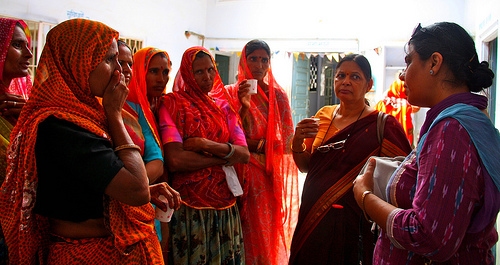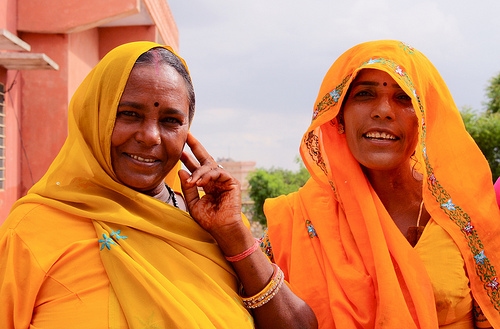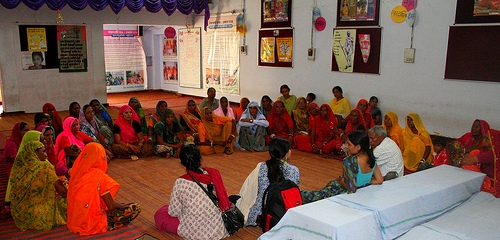Women Farmers, Drought & Resilience
Rucha and I visited block Chaksu in Jaipur district the same afternoon and met some of the most inspiring women farmers who are served by CECOEDECON. These farmers were representatives of a strong women’s Self Help Groups (SHG) created to provide micro loans among the group and generate small savings that are held in a common bank account. The SHG also receives a collateral security from CECOEDECON to receive larger loans from financial institutions, such as SIDBI and NABARD. This SHG has emerged from mahila mandals (women’s groups) that over the years resulted in the formation of women’s cooperatives. The women have received extensive training in financial management, including book keeping, and other procedures on running cooperatives effectively. The women now have a complete sense of ownership, leadership and control in managing their affairs. These qualities were evident in the women who had gathered at the CECOEDECON’s offices to meet us.
The women, most of whom are farmers, showed immense interest in learning about water management techniques (paani ka mudda) and saving indigenous varieties of seeds (beej bhaat/ desi beej). Women in this arid region are severely affected by droughts and dwindling rains. In some areas, we learned that it had rained after four years of drought. The women articulated a need for capacity building support for implementing relevant innovative coping strategies in the face of climate change. They also expressed interest in learning about appropriate technologies, like building soak pits, maintaining their village hand pumps, rain water harvesting systems and other sustainable water management systems to counter the debilitating impact of fluoride pollution in their wells. They expressed concern about health, education and sanitation issues that affected their children and observed that when their young ones fell ill, the women, as mothers and care givers, suffered as well. The women clearly had made the connections between the health and well-being of their families and livelihoods to their natural environment and that climate change coping mechanisms needed to be implemented soon at the community level.
Blog entry by Arshinder Kaur, WEA India Coordinator, and a founding mother.
A few days ago, I had the rare honor of witnessing the work of an innovative community-based organization called CECOEDECON that works on holistic rural development initiatives in the desert state of Rajasthan in India. I was on a site visit with Rucha, WEA’s India Program Director, to learn how this group is advancing the rights of marginalized women farmers, many of whom are on the frontlines battling climate change issues. CECOEDECON’s inspiring women leaders, Manju Joshi and Alka Avasthi, co-Deputy Directors who provide strategic programmatic and organizational direction, shared with us how their group works on issues related to natural resource management, livelihoods and gender. Kavita Mishra, a dynamic project coordinator, highlighted issues related to Panchayati Raj, a system of self-governance in India at the village, block and district levels. She manages stakeholder partnerships, youth and gender issues and participatory mechanisms for enhancing the value of girl child and eliminating sexual exploitation.


Many women farmers were passionate advocates of sustainable agriculture and natural resource management practices that would sustain their livelihoods in this drought-prone arid landscape. Some elders had strong reservations on corporations and foreign companies who were selling expensive hybrid seeds and chemical fertilizers that left the marginal and small farmers in a debt trap given the high costs involved in purchasing such packages. Issues related to land rights were also a priority for women, although many said that they had fought for joint ownership of land, which was heartwarming to hear.
We also had a chance to visit Niwai block in the district of Tonk with Manju Joshi, who shared a wonderful rapport with the community. We met a mixed group of men and women, members of the Kisan Sewa Samiti (Farmer’s Club). Manju Ji noted that no success can be made in gender development efforts if men were excluded from the overall objectives and were not sensitized about women’s unique issues and perspectives, as well as their tremendous potential to advance the health and well being of their families and communities. There are 103 villages in the blocks, where CECOEDECON is working and issues affecting women, children and youth, as well as livelihoods, such as agriculture and dairy, and education are raised. There is a children’s committee, known as bal panchayat, that addresses problems affecting the younger demographic. Critical issues affecting the villages and blocks are escalated at a state level people’s self-governing committee called the Maha Sangh.

At our meeting with the farmer’s club, men and women both expressed concern on the changing weather and monsoon cycles, which was affecting their farm harvest. They shared their struggles with recurring droughts that had adversely affected their crops and livelihoods and had led to widespread migration from surrounding villages. A glimmer of hope came through a personal story of a woman farmer who said that even during difficult times she sowed indigenous seeds and used organic compost, which made her more self sufficient as she did not rely on the market to buy additional inputs. Other farmers noted that poor health prevalent among the younger generation was because of the change in their dietary habits, where people moved away from nutritious healthy grains like millets. The members shared that a major issue affecting many villages is the presence of fluoride in their water sources. Nearly 15 villages are affected with alarming levels of fluoride, and with diminishing rainfall, water is being extracted from deeper stone plates that has higher levels of fluoride.

An inspiring elder woman farmer called Kamla Devi shared that she farmed organically using goat manure, and grew a small vegetable garden using vermicompost in a small terraced landscape. She told us that once she tried growing a hybrid variety of pearl millet purchased from the market, but was shocked when the seeds did not germinate. This reinstated her faith in farming with indigenous seeds. She is now a strong proponent of seed sovereignty and in the self-reliance of farmers in using natural inputs from their own farms and through farmer-to-farmer seed exchanges. Kamla leads by example for other women and men farmers who wish to make strides in self-sufficiency and sustainable agriculture practices. Today, she is a respected elder in her community and beyond and has traveled to Italy, Nepal and Bangladesh advocating for ecologically sound agricultural practices. She’s a true visionary, and her fellow members of the Kisan Sewa Samiti were beaming with pride on her accomplishments.

